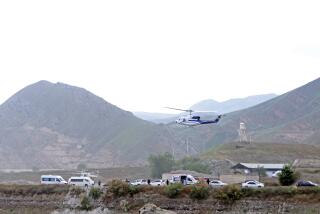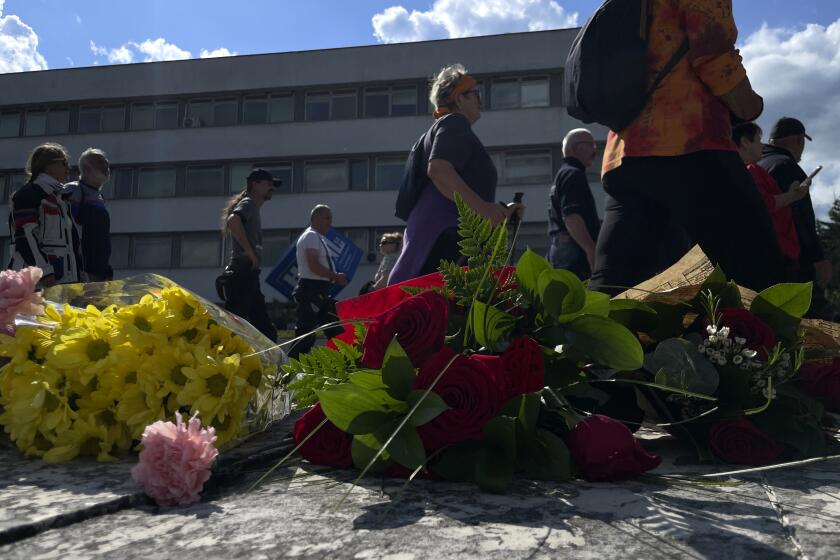Colorado Mining Town Lures Retirees to New Heights : Rocky Mountains: Lake City is truly inhospitable. Nonetheless, growing numbers of elderly flock there for the ‘thrill of it.’
It’s about as inhospitable a spot for retirement imaginable. At 8,671 feet, the old mining town is most famous for a winter that Alferd Packer survived by eating the prospectors he was guiding.
Even now most businesses close during the winter, and the nearest doctor is 55 miles away.
But Lake City has become home to a growing number of retirees, including Air Force officers, a senior partner in an Atlanta law firm, a university professor and firefighters.
Across the nation, the principle of thermodemographics no longer dictates the destiny of the newly retired. The Sun Belt remains popular, but retired Californians are turning up in Maine. Western Kansans have retired to Minneapolis. New Yorkers have been spotted in Mississippi.
“Summers [in Arizona and Florida] can be more insufferable than a cold winter in the Rockies,” said David Savageau, author of the popular book “Retirement Places Rated.”
The Rocky Mountain region recorded a 43.6% increase in people 65 and older between 1980-90, the biggest increase of any region in the country, according to the 1990 Census. Colorado’s state demographer, Jim Weskott, who has access to figures on Medicare recipients in each county, says they indicate the influx of retirees has increased substantially since 1990.
Savageau says the possibility of interesting jobs or volunteer positions also can draw people. He said someone is probably already writing a book called “The End of Retirement.”
“It’s thrilling to me. People don’t just retire to Florida to bake and die. They’ve got 40 good years. Medicine is backing them up,” said Thomas B. Beard, president of the Battlement Mesa Co. It operates a more conventional retirement community of 2,400 between Grand Junction and Glenwood Springs in western Colorado.
Few in the Lake City group are ready to put their feet up, and their presence is felt in a town with a winter population of barely 300.
Some have gotten into business for themselves. Nearly everyone serves as a volunteer, firefighter, ambulance driver or member of a planning or library board.
Ray Blaum, a military man like his father and grandfather, moved here after retiring from the Air Force as a lieutenant colonel in Langley, Va. His last assignment was working with computers.
“I went to work in real estate. I had no idea if I could survive here. I said I would do whatever it takes, even pick up aluminum cans along the roadside,” Blaum recalled.
“I don’t like warm weather. I hated cutting grass in the summer in Virginia,” he added.
Blaum, never in combat in the military, was talked into becoming a reserve Hinsdale County sheriff’s deputy, and later became the only full-time deputy. Sheriff Roger Coursey was shot and killed by burglars at a roadblock outside Lake City on Nov. 18, Blaum emptying his gun into their fleeing vehicle.
Blaum, 57, was appointed to succeed Coursey. Now he plans to seek election to the job.
“I’m not religious, but I guess we’re here for a purpose.”
Not many retirees are likely to become sheriff in their new retirement homes, but many of those who retire before age 65 return to work.
The U.S. Labor Department recently reported that “full- and part-time work among retired men [those receiving income from a pension] younger than 65 has increased markedly in recent years.” In the 55-61 age group, for example, the rate rose from 37% in 1984 to 49% in 1993.
This group will swell. Hundreds of thousands, if not millions, of workers in their late 40s and 50s are eligible for retirement or are being retired early by the military, government and businesses trying to cut payrolls.
In addition to good pensions that permit them to live where they choose, they “have the psychic reserves [to move] because they’ve been doing it all their lives,” said Charles F. Longino Jr. of Wake Forest University, author of “Retirement Migration in America.” And regional cultural differences don’t matter as much these days.
Retired Lt. Col. Simon Copeland, 56, a former Air Force pilot, sold real estate in Florida for a time, then “kind of dropped out and played golf for awhile.”
He had visited Lake City several times to hunt elk, and “I fell in love with the place.” It’s a comment often heard from retirees, many of whom came here first on vacation. Lake City is an increasingly popular summer resort.
“It had everything I was looking for. Clean water, clean air and a small population.” He remembers “coming up prepared to build a cabin with a pickup truck and two dogs.”
“I met Betsy [Cheney]. She had the dogs, the Jeep and the cabin.” They married.
Bob Spears, 67, left his position as a senior law partner in Atlanta in 1989 to open a small firm at a client’s request in Dallas. He had always been an avid backpacker, and one visit to Lake City--the San Juan Mountains tower over it, soaring above 14,000 feet--sold him and his wife, Jane.
“Just about halfway through town we said, this looks like it’s it. We drove in on Thursday and bought a house on Tuesday,” Spears said.
The lack of a doctor--the town clinic is staffed by a nurse-practitioner--doesn’t faze Spears. “It’s only 55 miles to Gunnison. I know. I drive the ambulance.”
Retired Lt. Col. Don Campbell, 50, actually had ties to Lake City. Campbell’s mother was born here, and the family owned a small house.
The former Air Force pilot went to Denver’s North High School and often visited Lake City in the summer, where he met his wife, Diane.
The couple has built an RV park. For Campbell, retirement “is just a change of jobs,” he said as he trudged through a May snowfall to complete work on his office-residence.
“Just putting my feet up would get boring real fast,” he added.
Both sons have graduated from college, one from West Point and the other from Michigan State, and the Campbells were ready to take a risk. He wouldn’t rule out a move to a warmer clime later, and admits living here can involve sacrifices.
“It’s not unusual to go out at 7 p.m. in winter and find nothing open.”
More to Read
Start your day right
Sign up for Essential California for news, features and recommendations from the L.A. Times and beyond in your inbox six days a week.
You may occasionally receive promotional content from the Los Angeles Times.






